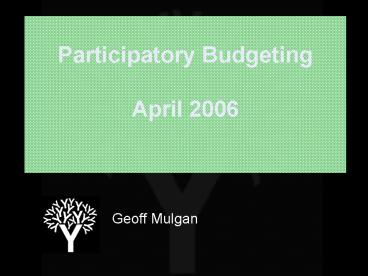Participatory Budgeting April 2006 - PowerPoint PPT Presentation
1 / 11
Title:
Participatory Budgeting April 2006
Description:
Slowing of public spending growth likely period of stability or retrenchment. Possible reshaping of national/local roles post Lyons ... – PowerPoint PPT presentation
Number of Views:32
Avg rating:3.0/5.0
Title: Participatory Budgeting April 2006
1
Participatory Budgeting April 2006
- Geoff Mulgan
2
UK policy context
- Slowing of public spending growth likely period
of stability or retrenchment - Possible reshaping of national/local roles post
Lyons - More visible choices at the margins eg
hospitals v primary care, policing or schools,
eldercare or childcare
3
Background to PB
- Two parallel dynamics
- Democratisation and decentralisation Europe,
Latin America, China, India - Reform of budgeting processes transparency,
targeting, outcome emphases - all to counter
corruption, waste, capture - Decades of experience of public engagement in
budgets opening decisions up to consultation,
simulations, referendums, primarily in US - Reconnecting taxation arguments about
transparency and engagement leading to greater
legitimacy
4
Participatory budgeting globally
- Long US experience at very local level and some
at state level (eg Oregon) - Known best from Porto Alegre over last two
decades - Participatory neighbourhood assemblies draw up
list of investment priorities for city budget,
elect delegates to take decisions - Tens of thousands participate, hundreds of new
associations, more effective administration,
redistributive effect - Local infrastructure budgets at first, then
mainstream services (e.g. health) - Co-decision power making cost-benefit
calculations more responsible attitude - Now in 300 cities round the world
- How you do it affects whether it adds value
- Needs to be integrated with local context
5
What works?
- None of the new methods are panaceas
participation can amplify conflicts,
disappointments vulnerable to capture issues of
knowledge and proportionality - But reasonable levels of success at least for
periods (issues of sustainability) - Driven by problems of legitimation for national
and local governments and so unlikely to
disappear and an alternative to top down
tightening of performance based budgeting models
which have their own limitations
6
Double Devolution as a context for PB?
- Argument for devolution from Whitehall to local
authorities, allowing more budgetary flexibility
alongside changes to tax base - Plus devolution down to neighbourhoods
potentially through new level of very local
governance
7
UK neighbourhood budgets?
- Devolved neighbourhood budgets are one
building-block - In UK small pot budgets already devolved or
delegated in many places to councillors or
parishes - Can this be done in a more participatory and
mainstream way? - Could enable democratic neighbourhood bodies to
draw down co-decision or commissioning power over
a neighbourhood element (e.g. 1) of mainstream
service budgets (extending to police, health?) - Raising extra funds through dedicated precepts,
neighbourhood pledges, local charges etc
8
UK quiet experiments
- Participatory process being developed for whole
NDC budget in Sunderland - Salford system developing to combine ½m devolved
budgets with action planning and influencing
wider services - Harrow Open Budget assembly enabled citizens to
shape priorities and elected follow-up panel - Bradford LSP - from 315K NRF to wider programme
9
UK LAAs and double devolution
- LAAs another potential context
- Currently mostly between GO and local authorities
at present - More bottom-up performance framework plus more
local financial autonomy could make a local
conversation with citizens about mainstream
budget priorities a more important part of the
process - More freedoms and flexibilities could be offered
to councils engaging communities to participate
in shaping next-generation LAA budgets - More bottom-up influence less top-down
constraint?
10
Local authority
Possible neighbourhood
services? Services that can be tailored or
devolved to nhoods. Service standards
shaped or set by nhood.
Strategic services Services that require
central planning, delivery oversight. Service
standards set by LA.
Education
Parks liveability
Nhood policing
Nhood policing
Housing management
Community safety
Social services
Grime
Frontline youth services
Health
Waste management
Devolved
Tailored
Influenced
Frontline services delivered at nhood level
tailored to local needs through partnerships
with service providers participatory planning.
Mainstream services delivered authority-wide.
Scope for local priorities to be reflected
through consultative processes.
Services commissioned or delivered by
neighbourhoods. Priorities service standards
set through community-led participatory planning.
Neighbourhood
Neighbourhood
11
Questions
- What is likely to be the context devolved
financial power? LAAs? Variable geometry? Will
there be new kinds of accountability for other
services eg health and democratic
contestability? - What kinds of participation are likely to work
best? Where is there demand? Balance of costs
and benefits? Proportionality? Complexity (PFI)?
- What relationship should there be between between
devolved neighbourhood budgeting influencing
wider mainstream services? - When are we talking about influencing priorities,
and when about co-decision power?































